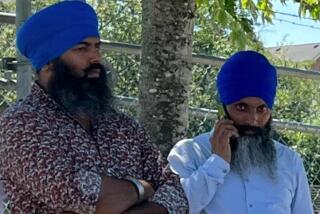Sikh temple shooting: Wisconsin gunman had a record
- Share via
OAK CREEK, Wis. — The gunman who killed six people at a Sikh temple had a criminal record, a history of involvement in the white supremacist movement and a checkered career in the Army, law enforcement authorities and organizations that monitor hate groups said Monday.
Nevertheless, Wade Michael Page, 40, was able to legally purchase a 9-millimeter handgun at a local gun store and was believed to have acted alone when he entered the temple in a Milwaukee suburb Sunday morning and opened fire.
“He bought it legally; he was not an ineligible person,” said James Santelle, U.S. attorney for the eastern district of Wisconsin.
PHOTOS: Gunman opened fire at Sikh temple
Page’s associations with right-wing extremists had drawn attention before from federal investigators, who looked into the possibility that he was providing funding to domestic terrorist groups, a senior U.S. law enforcement official said.
Investigators determined that there was not enough evidence to begin a full-scale investigation of a U.S. citizen, according to the official, who spoke on condition of anonymity. The official did not elaborate on the source or nature of the alleged funding.
Page, a burly man with a goatee and prominent tattoos who played guitar in white power punk bands, was shot and killed by a police officer who emerged as one of several heroes of the tragedy. By then, Page had fatally wounded six members of the Sikh temple, known as a gurdwara, and critically wounded three other people, including a police officer ambushed while checking on a victim, officials said.
The bloodshed in Oak Creek instantly recalled the shooting that killed 12 people and wounded 58 just 16 days earlier in Aurora, Colo. Although the circumstances were quite different, both events brought terror to places that served as refuges from the turmoil and stress of the everyday world.
“It broke my heart that this thing happened, especially just a few weeks after this Aurora thing,” said Shiva Singh, a member of the Sikh community from Chicago who drove in to support the Oak Creek community. “It just breaks my heart.”
The dead were identified as Suveg Singh Khattra, 84; Prakash Singh, 39; Ranjit Singh, 49; Paramjit Kaur, 41; Sita Singh, 41; and temple president Satwant Singh Kaleka, 65. All but Kaur were men. Sikh men traditionally take the name Singh, meaning lion; women take the name Kaur, meaning princess.
At the two-story home Suveg Singh Khattra shared with his family, men wearing turbans sat on the floor in one room Monday while women shared the floor in another.
A farmer from India’s Punjab state, Khattra and his wife came to the U.S. in 2004 and lived with their son and his family, according to his granddaughter, Sandeep Kaur Khattra, 24. A devoted worshiper, Khattra went to the temple daily, and passed time at home listening to holy readings on television and radio.
His days at the temple grew longer when his wife died in 2010, his granddaughter said, usually lasting from early morning until midafternoon.
“I think that’s where he felt at peace,” she said. “That’s where he wanted to be.”
The wounded included Police Lt. Brian Murphy, 51, who was shot eight or nine times at close range, Oak Creek Police Chief John Edwards said. He remained in critical condition Monday at Froedtert Hospital in Milwaukee, as did another victim, Santokh Singh, 50.
The shooting shattered an immigrant community that is no stranger to persecution. But Sikh leaders in Oak Creek said they were not making any assumptions about the motives behind the shooting.
“At this point, we’re not prepared to say whether this is a hate crime or a random act of violence,” said Bhupinder Saini, a member of the temple congregation, at a news conference. “That remains to be seen. But this has been a sad day for all of us, and it will be a sad day for days and weeks ahead.”
Since Sept. 11, Sikhs, most of whom come from India, have faced some of the same challenges as American Muslims, with whom they sometimes have been confused.
Said Saini: “We’d like to view this tragedy as an opportunity to tell the world what Sikhs are. Sikhs believe in peace and harmony. As a tradition, Sikhs do not cut their beards, and they wear turbans. Just the fact that they wear turbans and do not cut their facial hair does not make them terrorists.”
On Monday night, several hundred people crowded shoulder to shoulder into a Sikh temple in Brookfield, Wis., to mourn the Oak Creek victims.
“In addition to mourning with you, we support you,” Gov. Scott Walker told the crowd. He wore an orange kerchief, a head covering the temple distributed to dozens of other visitors at the service. “Tonight we are here to show our love and the love you have brought to us.”
At the end of the service, the crowd moved outside to a field where crickets chirped as people lighted candles and chanted prayers into the summer night.
At a news conference earlier in the day attended by a number of Sikh men, many elderly, Edwards and FBI Special Agent Teresa Carlson emphasized their belief that the shooter acted alone.
“We are confident at this point that it was only one,” Edwards said. “He is the only shooter that was involved at the temple.”
Carlson said Page had a criminal record but refused to elaborate.
They displayed a photo of a “person of interest,” a man apparently seen outside the temple the day of the shooting. By day’s end, the FBI’s Milwaukee office said the person of interest had been found, interviewed and ruled out as a suspect.
The details that emerged about Page pointed to a man with a troubled history of extremism and personal failure.
Page had served in the Army from April 1992 to October 1998, spending most of his time at Ft. Bliss, Texas, and Ft. Bragg, N.C. Although he rose to the rank of sergeant and served as a psychological operations — or “psy-ops” — officer, he was eventually demoted to specialist, reportedly for drinking and going AWOL. A Pentagon spokeswoman said it was not immediately clear whether he had received an honorable discharge.
Nor was it clear how Page spent all the time since his discharge. The Associated Press reported that he bought a brick ranch house outside Fayetteville, N.C., in 2007. A notice at the house indicated that it was in foreclosure and was sold to a bank in January.
From February to mid-July, Page worked at LucasMilhaupt, a metal parts manufacturer a few miles from his home in Cudahy, Wis., said company President Philip Malliet.
Malliet would not say what Page did at the company but said he left of his own accord last month.
The Southern Poverty Law Center, which tracks extremist groups, called Page “a frustrated neo-Nazi” who had been “a member of two racist skinhead bands” — End Apathy and Definite Hate. It said the latter band’s album, “Violent Victory,” featured “a gruesome drawing of a disembodied white arm punching a black man in the face.”
The Anti-Defamation League, which also keeps tabs on extremists, said Page had white supremacist tattoos, including a Nazi Death’s Head.
Page’s landlord in Cudahy, Kurt Weins, said a photo on the band’s MySpace page appeared to show Page. The man identified as Wade had “14” tattooed on his arm atop an Odin’s cross, which represents white pride. The number 14 is a common neo-Nazi tattoo alluding to the popular 14-word supremacist phrase, “We must secure the existence of our people and a future for white children.”
Page’s record label, Label 56, at one point posted an interview with him on its website. In it, he said that he founded End Apathy while trying to figure out “what it would take to actually accomplish positive results in society and what is holding us back. A lot of what I realized at the time was that if we could figure out how to end people’s apathetic ways, it would be the start towards moving forward. Of course after that it requires discipline, strict discipline, to stay the course in our sick society.”
Label 56, which specializes in bands espousing white nationalism or supremacy, took down all material related to Page’s bands Monday and posted a statement expressing sorrow over the shooting and sympathy for “the families and friends of those who were affected.”
Page’s family texted a statement to a Milwaukee Journal Sentinel reporter Monday, saying they were “devastated by the horrific events” and asking for privacy. “While there can be no words of comfort that will make sense of what happened that day, please be aware that our thoughts and prayers go out to all the victims and their families,” said the family, at least some of whom live in Colorado.
Oak Creek Mayor Steve Scaffidi, who has been in office only 4 1/2 months, struggled to answer the question that always arises after an inexplicable tragedy: Why here?
“I don’t think there’s any rhyme or reason,” he said. “We’re a safe city.”
The former farming community of 34,495, where the police department still borders a cornfield, has been diversifying as it grows, with Sikhs among the fastest-growing minorities and the most willing to reach out, he said.
“That’s part of what makes this so shocking — this is a group that wants to be involved,” he said.
Scaffidi said that, after he received a call from President Obama late Sunday, his phone rang again: It was the mayor of Aurora, Colo., Steve Hogan. The two talked about the challenges they will face in coming weeks, and how to deal with tragedy, he said. Scaffidi said he asked how the Aurora mayor had been coping, and Hogan offered some pointers.
Scaffidi seemed to be speaking for both cities when he said: “We’re not going to let this define us.”
molly.hennessy-fiske@latimes.com
mitchell.landsberg@latimes.com
Hennessy-Fiske reported from Oak Creek, Bennett from Washington and Landsberg from Los Angeles. Dan Hinkel and Kim Murphy in Oak Creek contributed to this report.
More to Read
Sign up for Essential California
The most important California stories and recommendations in your inbox every morning.
You may occasionally receive promotional content from the Los Angeles Times.










